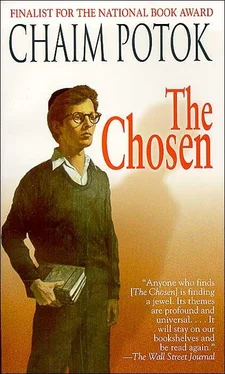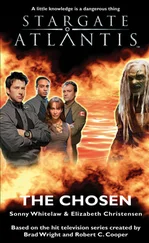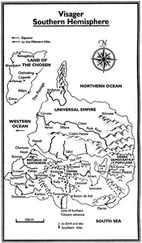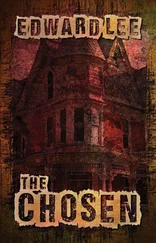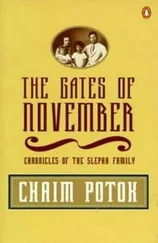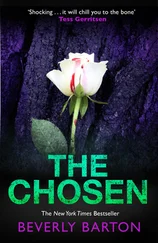Not only had my home life been affected by Palestine but my school life as well. Every shade of Zionist thought was represented in Hirsch College, from the Revisionists, who supported the Irgun, to the Neturai Karta, the Guardians of the City, the city being Jerusalem. This latter group was composed of severely Orthodox Jews, who, like Reb Saunders, despised all efforts aimed at the establishment of a Jewish state prior to the advent of the Messiah. A recent influx of Hungarian Jews into our neighborhood had swelled their ranks, and they formed a small but highly vocal element of the school's student population. Even the rabbinic faculty was split, most of the rabbis voicing their hope for a Jewish state, some of them opposing it, while all of the college faculty seemed to be for it. There were endless discussions during the afternoon college hours about the problem of dual loyalty what sort of allegiance could an American Jew have toward a foreign Jewish state? – and invariably these arguments revolved around this hypothetical question: On what side would an American Jew fight should America ever declare war against a Jewish state? I always answered that the question was silly, America would never send Jews to fight against a Jewish state; during the Second World War she had sent Japanese Americans to fight the Germans, not the Japanese. But my answer never seemed to satisfy anyone. What if America did want to send Jews to fight against a Jewish state? the theorists countered. What then? The discussions were quite heated at times, but they went on only among those students and teachers who favored a Jewish state. Many of the Hasidim ignored the question completely. Despising as they did all efforts in behalf of a Jewish state, they despised as well all discussions that had to do with even its possible existence. They called such discussions bitul Torah, time taken away from the study of Torah, and looked upon all the disputants with icy disgust.
Toward the middle of February, the various factions began to firm up their ranks as the entire spectrum of Zionist youth movements moved into the school in a drive for membership, the second such drive since I had entered the college. From that time on – the recruitment drive lasted a few days – every student's position was clearly defined by the Zionist philosophy of the group he had joined. Most of the pro-Zionist students, myself included, joined a religious Zionist youth group; a few joined the youth arm of the Revisionists. The anti-Zionist students remained aloof, bitter, disdainful of our Zionism.
In the lunchroom one day, one of the Hasidim accused a member of the Revisionist youth group of being worse than Hitler. Hitler had only succeeded in destroying the Jewish body, he shouted in Yiddish, but the Revisionists were trying to destroy the Jewish soul. There was almost a fist-fight, and the two students were kept apart with difficulty by members of their respective sides. The incident left a bitter taste in everyone's mouth and succeeded only in increasing the tension between the pro-Zionist and anti-Zionist students.
As I expected, Danny did not join any of the Zionist groups.
Privately, he told me he wanted to join my group. But he couldn't. Did I remember his father's explosion over Zionism? he wanted to know. I told him I had had nightmares about that explosion. How would I like an explosion like that with every meal? Danny asked me. I didn't think the question required an answer and told him so. Danny nodded grimly. Besides, he added, the antiZionists among the Hasidic students looked upon him as their leader. How would it be if he joined a Zionist group? It would do nothing but add to the already existing bitterness. He was trapped by his beard and earlocks, he said, and there was nothing he could do. But one day… He did not finish the sentence. He remained aloof, however, never participating in the quarrels between the pro-Zionist and anti-Zionist groups. And during the near fist-fight in the lunchroom, his face went rigid as stone, and I saw him look with hatred at the Hasidic student who had started the quarrel. But he said nothing, and after the disputants had been half carried, half dragged, from the lunchroom he returned immediately to the math problem we had been discussing.
In the third week of February, the newspapers reported that British Foreign Minister Bevin had announced his intention to bring the Palestine issue to the United Nations in September. My father was delighted, despite the fact that the news cost him some extra nights of work rewriting the speech he was to give at the rally.
He read the speech to me the Shabbat afternoon before the rally. In it he described the two-thousand-year-old Jewish dream of a return to Zion, the Jewish blood that had been shed through the centuries, the indifference of the world to the problem of a Jewish homeland, the desperate need to arouse the world to the realization of how vital it was that such a homeland be established immediately on the soil of Palestine. Where else could the remnant of Jewry that had escaped Hitler's ovens go? The slaughter of six million Jews would have meaning only on the day a Jewish state was established. Only then would their sacrifice begin to make some sense; only then would the songs of faith they had sung on their way to the gas chambers take on meaning; only then would Jewry again become a light to the world, as Ahad Ha'am had foreseen.
I was deeply moved by the speech, and I was very proud of my father. It was wonderful to know that he would soon be standing in front of thousands of people, reading the same words he read to me that Shabbat.
The day before the scheduled date of the Madison Square Garden rally there was a violent snowstorm, and my father walked like a ghost through our apartment, staring white-faced out the window at the swirling snow. It fell the entire day, then stopped. The city struggled to free itself of its white burden, but the streets remained choked all the next day, and my father left in the evening for the rally, wearing a look of doom, his face ashen. I couldn't go with him because I had a logic exam the next day and had to remain home to study. I forced myself to concentrate on the logic problems, but somehow they seemed inconsequential to me. I kept seeing my father standing at the rostrum in front of a vast, empty hall, speaking to seats made vacant by the snow. I dreaded the moment I would hear his key in the lock of our apartment door.
I did as much studying as I could, hating Professor Flesser for springing the exam on us the way he had done; then I wandered aimlessly through the apartment, thinking how stupid it was to have all my father's work ruined by something like a snowstorm.
Shortly before one in the morning, I heard him open the door.
I was in the kitchen, drinking milk, and I ran out into the hallway. His face was flushed with excitement. The rally had been a wild success. The Garden had been packed, and two thousand people had stood on the street outside, listening to the speeches over loudspeakers. He was elated. We sat at the kitchen table, and he told me all about it. The police had blocked off the street; the crowd's response to the speeches urging an end to the British mandate and the establishment of a Jewish state had been overwhelming. My father's talk had been wildly cheered. A senator who had spoken earlier had come up to him after the rally and had enthusiastically shaken his hand, promising him his complete support. There was no question that the rally had been a success. It had been a stunning success – despite the snow-choked streets.
It was after three in the morning when we finally went to bed. The rally made the front pages of all the New York papers the next day. The English papers carried excerpts of the senator's speech and briefly mentioned my father. But all the Yiddish papers quoted him extensively. I was the center of considerable attention on the part of the Zionist students and the target of icy hatred from the ranks of the anti-Zionists. I paid no attention to the fact that Danny did not meet me in the lunchroom. Between my fatigue over lack of sleep and my excitement over the rally, I did quite poorly in the logic exam. But I didn't care. Logic didn't seem at all important now. I kept seeing my father's excited face and heard his voice telling me over and over again about the rally.
Читать дальше
